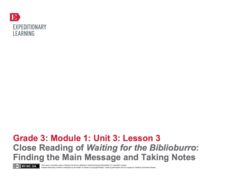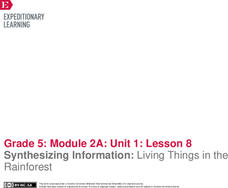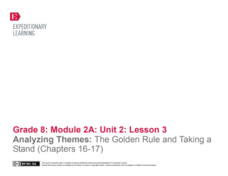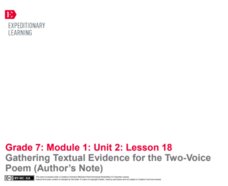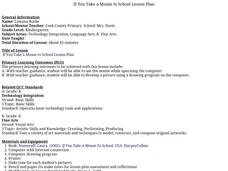California Education Partners
Frog and Toad Together by Arnold Lobel
A three-part assessment tests scholars' reading and writing capabilities. Young readers listen to and read an excerpt from Frog and Toad Together by Arnold Lobel. After drawing pictures of what is memorable, learners discuss their notes...
EngageNY
Mid-Unit 3 Assessment, Part II: Organizing Notes for a Public Speech
It's all a matter of opinion! Pupils take Part II of the mid-unit assessment, in which they continue organizing their notes in preparation for writing an opinion speech. Using the resource, they add reasons, evidence, and a concluding...
Curated OER
Comprehension: Compare and Contrast Topics in Two Texts
A scripted lesson can be a big help for new teachers. This fully scripted three-day learning activity provides teachers with the means to demonstrate how to compare and contrast two topics in two texts. Learners will work as a class to...
Curated OER
James and the Giant Peach Character Study
Every book has a few great characters, but James and the Giant Peach is the only one whose characters travel in a piece of fruit. The class creates T-charts for the main characters of the novel, while reading the book. They write actions...
Curated OER
Explanation Expedition
In this clever research lesson, student groups research certain cultural aspects of a foreign country, and fill out a worksheet with notes. In this note taking lesson, 5th graders write about the environment, entertainment, art, and...
Curated OER
Waterfalls
Third graders practice identifying the main idea and supporting details when reading informational text. They read text related to waterfalls and practice note taking skills to identify critical details. Students use their notes to...
EngageNY
Close Reading of Waiting for the Biblioburro: Finding the Main Message and Taking Notes
Expose your class to Waiting for the Biblioburro, narrative nonfiction that will act as the bridge between ficiton and informational texts to come. Class members do a close reading of the text, looking at excerpts instead of the whole...
The New York Times
The One-Question Interview
Generate interest in current events, the theme of a new unit, or a research project. Individuals select a question from the list generated by the class, conduct one-on-one interviews, analyze the responses, draw conclusions based on...
EngageNY
Synthesizing Information: Living Things in the Rainforest
How is a map a type of informational text? Class members view a world map of major rainforests, discussing its text features with a partner. Next, they take notes on key details from multiple texts about rainforests and write an...
EngageNY
Close Reading: Focusing on Taking a Stand (Chapter 2 cont.)
Scholars complete a close read of To Kill a Mockingbird and determine why characters take a stand. They use text-dependent questions and Note-catchers to help guide their thinking. Readers review the Taking a Stand Anchor chart and...
EngageNY
Reading for Details: Taking an Inventory in the Rainforest (Pages 28–31)
Take inventory. Scholars analyze pages 28-31 of The Most Beautiful Roof in the World and use a note catcher to model how Meg Lowman took inventory of the species in the rainforest. Learners then take a close look at the vocabulary in the...
EngageNY
Analyzing Themes: The Golden Rule and Taking a Stand (Chapters 16-17)
Positive or negative? Class members take another look at one of the taking-a-stand photographs from lesson plan one. They talk with partners to connect the picture to the text in To Kill A Mockingbird and discuss to determine when taking...
EngageNY
Introducing “If” and Noting Notices and Wonders of the First Stanza
After reading chapter 14 of the story Bud, Not Buddy by Christopher Paul Curtis, scholars take part in a read-aloud of the poem If by Rudyard Kipling and compare it to the reading of Bud, Not Buddy. Learners then go deeper into the poem...
EngageNY
Gathering Textual Evidence for the Two-Voice Poem (Author’s Note)
Writers take a look at how to gather evidence from the information text in the unit that connects to Salva and Nya’s story. They complete a Gathering Evidence from Informational Texts sheet to guide their work. Pupils then use the...
Curated OER
Digging for Treasure: Note-Taking Skills for Primary Children
Second graders study the criteria for biographies and the vocabulary that is specific person and time. They take notes, write e-mail and gather information on a famous person.
Curated OER
Writing a Biography - Helen Keller
Students investigate inspirational figures by researching Helen Keller. In this biography lesson, students utilize the Internet to take notes about the life of Helen Keller. Students complete a biography question worksheet which they...
Curated OER
Raven Chapter 11 Guided Notes: How Cells Divide
Take your advanced biology learners across the great divide: where cells divide, that is! Although it was created as a chapter reading guide, having your class complete this worksheet is not only appropriate, but also highly valuable in...
EngageNY
Documenting Research: Sorting and Recording Information About the Wheelwright
Fourth graders practice using a graphic organizer to record their notes and answer text-dependent questions while supplying evidence of how they found their answer. They focus on a machine called the wheelright, which was commonly used...
Curated OER
Recording the Deed: Note-Taking on Heroes
Students prepare to write summaries of heroes. In this note-taking lesson, students listen to a guest speaker discuss the attributes of unsung heroes and take Cornell method notes.
Curated OER
Comprehension-Note Taking Skills to Supprt Opinions and Panel Discussion
Fifth graders examine note taking skills in order to support opinions. In this language arts lesson, 5th graders read several newpaper articles and discuss a current issue. Students explore how to paraphrase so as not to commit plagiarism.
Curated OER
Summarizing
Pupils use their note-taking skills to write summaries of information. In this writing skills lesson, students use the notes they have taken in another lesson to write adventure stories by implementing the Rule-Based strategy.
Curated OER
The "Write" Stuff: Third Grade Strategies and Conventions
Students analyze the writing process through the ten lessons of this unit. The expository lessons address topic and detail sentences, paragraph organization and development, note taking, reports and letter writing.
Curated OER
If You Take a Mouse to School Lesson Plan
The book If You Take a Mouse to School is sweet, enjoyable, and so fun to read. Little learners hear the tale of Mr. Mouse and all the trouble he causes. They discuss the book as a large group and then split up into smaller groups to use...
Curated OER
Revive Reviews With Student-Created Study Guides
Learners work cooperatively in small groups to practice note-taking and outlining skills which are applied as student create unit Study Guides for their classmates. They demonstrate critical thinking skills as they decide the most...
Other popular searches
- Note Taking Skills
- Cornell Note Taking
- Note Taking Strategies
- Note Taking Paraphrasing
- Note Taking While Reading
- Summarizing and Note Taking
- Note Taking Graphic Organizer
- Cambridge Note Taking
- Teaching Note Taking Skills
- "Teaching Note Taking
- Note Taking Skills, Science
- Note Taking Math








